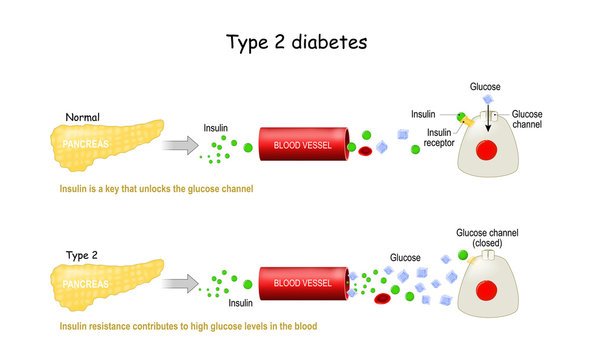
What Fruit Can Reverse Type 2 Diabetes? Exploring Nature’s Sweet Solution.
- What is Type 2 Diabetes?
- The role of diet in managing Type 2 Diabetes
- Can fruits play a role in reversing or managing Type 2 Diabetes?
- Understanding Type 2 Diabetes
- How Type 2 Diabetes Affects the Body
- Key Risk Factors for Type 2 Diabetes
- Importance of Lifestyle Changes in Managing Type 2 Diabetes
The Science Behind Fruits and Blood Sugar Control
- The Glycemic Index of Fruits and Its Impact on Blood Sugar
- How Fiber in Fruits Helps Control Blood Sugar Levels
- Role of Antioxidants in Managing Diabetes
Top 5 Fruits That Can Help Reverse or Manage Type 2 Diabetes
- 1. Berries (Blueberries, Strawberries, Raspberries)
- High Antioxidant Content for Better Insulin Sensitivity
- 2. Apples
- Quercetin and Fiber for Blood Sugar Regulation
- 3. Avocados
- Healthy Fats for Better Insulin Function
- 4. Citrus Fruits (Oranges, Grapefruit)
- Vitamin C and Its Role in Managing Insulin Resistance
- 5. Kiwi
- High Vitamin C Content and Its Role in Glucose Metabolism
Other Fruits That May Benefit Those with Type 2 Diabetes
- Grapes
- Pears
- Pomegranates
- Cherries
How to Incorporate These Fruits into Your Diet for Maximum Benefit
- Best Ways to Eat Fruits to Manage Blood Sugar
- Smoothie Recipes for Diabetics
- Adding Fruits to Your Meals
- Fruit-Based Snacks for Managing Cravings
Complementary Lifestyle Factors for Managing Type 2 Diabetes
- Exercise and Physical Activity
- Importance of Hydration
- Getting Enough Sleep
- Stress Management and Its Effect on Blood Sugar
Clinical Studies and Expert Opinions
- Research on Fruit Consumption and Type 2 Diabetes
- Insights from Diabetes Experts and Nutritionists
Conclusion
FAQs
- Can fruits completely reverse Type 2 diabetes?
- How much fruit can a diabetic eat daily?
- Are there fruits that diabetics should avoid?
- What is the best time to eat fruit for diabetics?
- Can fruit smoothies help manage Type 2 diabetes?
What Fruit Can Reverse Type 2 Diabetes? Exploring Nature’s Sweet Solution
Type 2 diabetes is a chronic condition that affects millions of people worldwide. While it is a condition that requires consistent management, many wonder if certain dietary changes can reverse or at least manage the symptoms of Type 2 diabetes. One popular question is whether fruits can play a role in managing or reversing this condition. In this blog post, we’ll explore which fruits may help manage blood sugar levels, improve insulin sensitivity, and support overall diabetes management.
Introduction

Type 2 diabetes is a condition where the body becomes resistant to insulin, or the body doesn’t produce enough insulin, leading to high blood sugar levels. While insulin resistance cannot be completely reversed by diet alone, a balanced diet plays a significant role in managing the condition. The question remains: can fruits, often seen as high in sugar, contribute to reversing Type 2 diabetes?
Let’s dive deeper into how fruits, when selected carefully, can provide essential nutrients that may help in managing and potentially reversing the symptoms of Type 2 diabetes.
Understanding Type 2 Diabetes
How Type 2 Diabetes Affects the Body
Type 2 diabetes develops when the body either becomes resistant to insulin or doesn’t produce enough of it. Insulin is a hormone that helps your cells absorb glucose (sugar) from the bloodstream to use as energy. Without enough insulin or proper insulin function, glucose builds up in the bloodstream, leading to high blood sugar levels.
Chronic high blood sugar can cause various complications, such as heart disease, nerve damage, and kidney problems. That’s why managing blood sugar is critical for individuals with Type 2 diabetes.
Key Risk Factors for Type 2 Diabetes
Some of the primary risk factors for developing Type 2 diabetes include:
- Obesity: Excess body fat, particularly around the abdomen, can increase the risk of insulin resistance.
- Sedentary Lifestyle: Lack of physical activity can impair the body’s ability to use insulin effectively.
- Poor Diet: Diets high in processed foods, refined sugars, and unhealthy fats contribute to Type 2 diabetes.
- Family History: Genetics play a role, as those with a family history of diabetes have a higher risk.
Importance of Lifestyle Changes in Managing Type 2 Diabetes
Along with medication, lifestyle changes such as adopting a healthy diet, regular exercise, and stress management are key factors in controlling blood sugar levels. By making these changes, some individuals can reduce their dependency on medication and even experience improvements in blood sugar control.
The Science Behind Fruits and Blood Sugar Control
The Glycemic Index of Fruits and Its Impact on Blood Sugar
The glycemic index (GI) is a measure of how quickly a food raises blood sugar levels. High-GI foods cause rapid spikes in blood sugar, while low-GI foods release glucose more slowly into the bloodstream. When managing Type 2 diabetes, it’s important to focus on foods with a low to moderate GI.
Fruits, for the most part, have a low to moderate GI, making them a healthy choice in moderation for people with Type 2 diabetes. However, some fruits, particularly those with higher sugar content, should be consumed with care.
How Fiber in Fruits Helps Control Blood Sugar Levels
Fruits are rich in dietary fiber, which helps slow down the absorption of sugar into the bloodstream. Fiber, especially soluble fiber, helps regulate blood sugar levels by delaying the breakdown of carbohydrates into glucose. This slow release of glucose prevents blood sugar spikes, making fruits an excellent choice for managing Type 2 diabetes.
The Role of Antioxidants in Managing Diabetes
Many fruits are packed with antioxidants, which help reduce oxidative stress and inflammation in the body. Chronic inflammation is a key factor in insulin resistance, and antioxidants help combat this. By incorporating antioxidant-rich fruits into the diet, individuals with Type 2 diabetes may improve their insulin sensitivity and protect their cells from damage caused by high blood sugar levels.
Top 5 Fruits for Brain Function
Here are five fruits scientifically linked to improving brain function and potentially helping to reverse or manage Type 2 diabetes:
1. Blueberries
Antioxidant Power for Memory and Focus
Blueberries are packed with antioxidants, particularly flavonoids like anthocyanins, which are known to enhance memory and cognitive function. Studies have shown that blueberries can improve insulin sensitivity, which helps the body process glucose more effectively. They also help fight oxidative stress, which is crucial for individuals with Type 2 diabetes.
2. Avocados
Healthy Fats and Their Role in Brain Health
Avocados are an excellent source of monounsaturated fats, which help improve blood flow to the brain. Healthy blood flow is essential for cognitive performance, as it ensures the brain receives the nutrients and oxygen it needs to perform optimally. Additionally, avocados contain magnesium and potassium, which support insulin function and blood sugar regulation.
3. Apples
Boosting Brain Function with Quercetin and Fiber
Apples are rich in quercetin, an antioxidant that helps reduce inflammation and protects brain cells from oxidative damage. Quercetin has been linked to improved memory and cognitive function. Apples also contain a significant amount of fiber, which aids in blood sugar regulation and prevents sudden spikes in glucose levels.
4. Bananas
Potassium and Vitamin B6 for Cognitive Clarity
Bananas are an excellent source of potassium, which is crucial for nerve function and maintaining a steady balance of electrolytes in the body. They also contain vitamin B6, which is essential for neurotransmitter production. By maintaining stable blood sugar levels, bananas can support both cognitive clarity and overall brain function.
5. Oranges
Vitamin C and Neuroprotective Benefits
Oranges are packed with vitamin C, a powerful antioxidant that protects the brain from oxidative stress. Vitamin C is also involved in the production of dopamine, a neurotransmitter that helps regulate mood, concentration, and motivation. Including oranges in your diet can provide your brain with a much-needed neuroprotective boost.
Other Fruits That Can Support Brain Health
read also: 5 Fruits for Improving Brain Function: A Natural Approach to Boosting Your Cognitive Health
While the above fruits are some of the best for enhancing brain performance, there are other fruits that can support cognitive health as well:
- Grapes: Grapes, especially red and purple varieties, are rich in resveratrol, an antioxidant known for its potential to improve brain function and memory. They also help improve blood circulation and reduce inflammation, which are important factors in managing Type 2 diabetes.
- Strawberries: Strawberries are packed with antioxidants that help reduce inflammation in the brain and improve cognitive function. The anthocyanins in strawberries also help protect brain cells from oxidative damage and improve memory.
- Pomegranates: Pomegranates contain high levels of antioxidants, which protect the brain from oxidative damage and improve memory and cognitive performance. Pomegranates may also help reduce inflammation and lower the risk of cognitive decline associated with Type 2 diabetes.
- Kiwi: Kiwi is rich in vitamin C and antioxidants, which help protect brain cells from oxidative stress. Studies have shown that vitamin C can improve cognitive function and overall brain activity, making kiwi a valuable fruit for managing Type 2 diabetes.
How to Incorporate These Fruits Into Your Daily Diet
Smoothies and Juices
Blend your favorite brain-boosting fruits, like blueberries, bananas, and oranges, into a delicious smoothie. You can add other nutrient-dense ingredients like spinach or chia seeds for additional health benefits.
Fruit-Based Snacks
Snack on fresh fruits like apples, pears, and grapes throughout the day to keep your blood sugar levels steady and your mind sharp. Pair these fruits with nuts or yogurt for added protein and healthy fats.
Adding Fruits to Your Meals
Add fruits like avocados, berries, and citrus fruits to your meals. You can incorporate them into salads, bowls, or even as a side dish for a sweet, healthy twist.
Timing Your Fruit Intake for Maximum Benefits
To avoid blood sugar spikes, try to eat fruit with meals or snacks that contain protein or healthy fats. This can help slow the absorption of sugars into the bloodstream and stabilize blood sugar levels.
Complementary Lifestyle Factors for Enhanced Brain Function
Exercise and Cognitive Performance
Regular physical activity improves blood flow to the brain and increases insulin sensitivity, which is key for managing Type 2 diabetes.
The Role of Sleep in Brain Health
Getting enough sleep allows the brain to rest and repair itself, consolidating memories and supporting overall cognitive function.
Managing Stress to Support Brain Function
Chronic stress can raise blood sugar levels, so practicing stress-reducing techniques like deep breathing, yoga, or meditation can improve brain health and help manage Type 2 diabetes.
Expert Opinions and Clinical Research
Studies on Fruits and Brain Function
Numerous studies have shown that fruits like blueberries and strawberries, rich in antioxidants, can improve cognitive function and protect against cognitive decline.
Expert Recommendations on Brain-Boosting Foods
Experts recommend incorporating a variety of fruits, especially those rich in antioxidants, fiber, and healthy fats, into your daily diet to support brain health and manage Type 2 diabetes effectively.
Conclusion
The role of fruits in managing Type 2 diabetes is undeniable. Fruits not only provide essential nutrients like fiber, antioxidants, and healthy fats but also help regulate blood sugar levels and protect the brain from oxidative damage. Incorporating the right fruits into your diet, along with other lifestyle changes like exercise and stress management, can significantly improve your cognitive health and help you manage Type 2 diabetes more effectively.
FAQshttp://Wikipedia https://en.wikipedia.org › wiki › FAQ
Can fruits completely reverse Type 2 diabetes? While fruits are an important part of a brain-boosting diet, they work best when combined with other healthy habits like regular exercise, sufficient sleep, and stress management.
How much fruit can a diabetic eat daily? Aim for at least 1-2 servings of fruit daily, focusing on a variety of fruits to ensure you’re getting a range of nutrients beneficial for brain health.
Are there any fruits I should avoid for brain health? No specific fruits are harmful for brain health, but overconsumption of fruits high in sugar, such as grapes in large amounts or processed fruit juices, may cause blood sugar spikes, which can affect brain function.
How much fruit should I consume daily for cognitive benefits? Aim for at least 1-2 servings of fruit daily, focusing on a variety of fruits to ensure you’re getting a range of nutrients beneficial for brain health.
Can a fruit-based diet boost memory retention? Yes, fruits rich in antioxidants and vitamins, like blueberries and strawberries, have been shown to improve memory retention and delay cognitive decline.





2 Comments